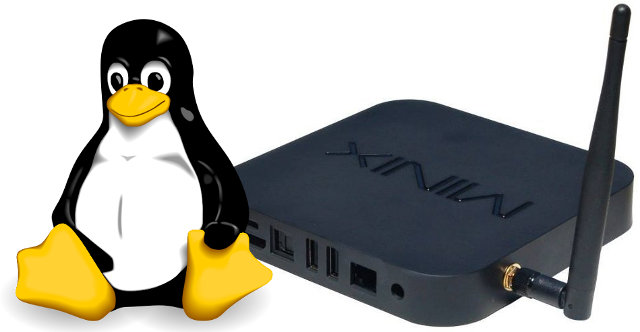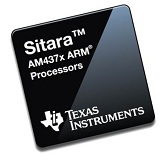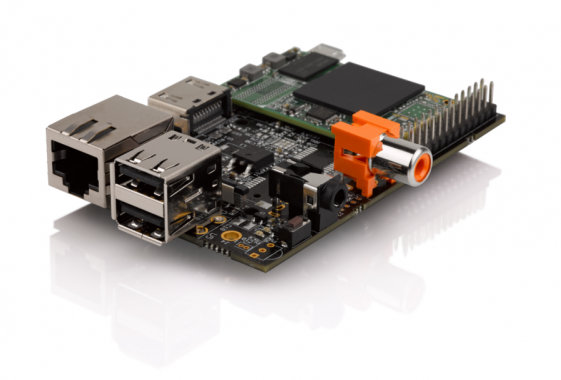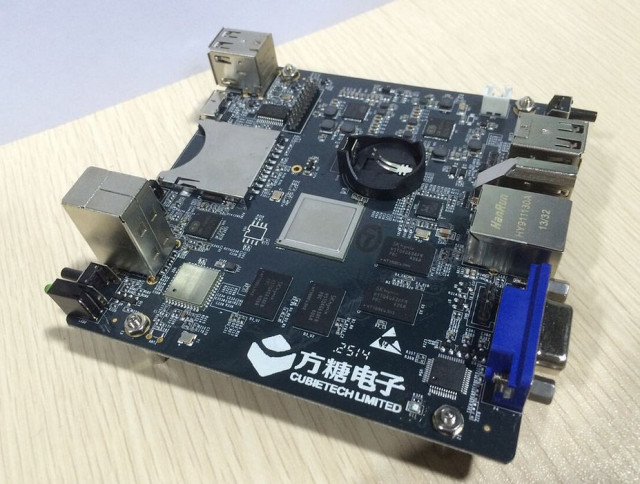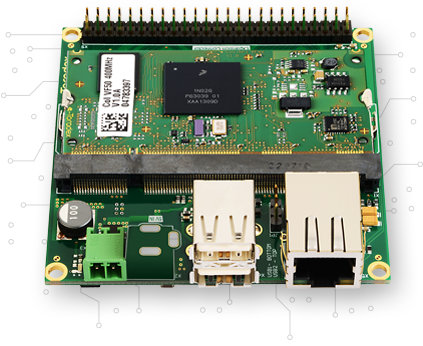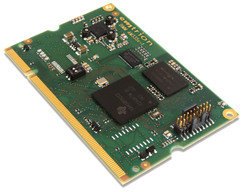Until recently, installing Linux on Rockchip R3188 based TV boxes or HDMI TV dongles meant you had to flash one or more binaries to your device using various type of tools for Linux or Windows. But thanks to various members of the community, it’s now as easy as flashing an image for the Raspberry Pi, as long as you own Minix Neo X7, PQ Labs iStick A350-SSD, Radxa Rock development board, or Rikomagic MK802IV (AP6210 or 8188EU Wi-Fi module versions) thanks to images provided by Ian Morrison on G+ mini PC community that can be booted from a (micro) SD card, which the added advantage that it won’t mess with your Android installation. You can do it whether you use a Windows or Linux PC, and it should also be possible on Mac OS X, but I don’t know the commands. Here are the steps to follow for MINIX NEO […]
Texas Instruments Announces Sitara AM437x Cortex A9 SoCs and Evaluation Modules
The first time I heard about Texas Instruments Sitara AM437x was via a TechNexion EDM-CT-AM437x system-on-module back in 2012, but Texas Instruments Sitara Cortex A9 processors development seems to have dragged a little longer than expected. Nevertheless, the company has now formally announced their Sitara AM437x ARM Cortex A9 SoC targeting automation, IoT gateways, and other industrial applications, and featuring four PRUs (Programmable Real-time Units), and support for dual camera for terminals with bar code scanning. At launch there will be four AM437xprocessors: AM4376, AM4377, AM4378, and AM4379. The processors will all be based on a single Cortex A9 core @ 800 to 1000 MHz with 64KB SRAM shared with 32KB data cache and 32KB programmable cache, 256 KB L2 and L3 caches, a 32-bit memory interface supporting LPDDR2, DDR3, and DDR3L, a 2-port Gigabit Ethernet switch , two USB 2.0 OTG + PHY and the following other interfaces: Serial Ports […]
SolidRun HummingBoard Raspberry Pi-Like Board is Now Available for $45 and Up
HummingBoard is a board made by SolidRun that’s mechanically compatible with the Raspberry Pi, and offering the same expansions connectors, and a few extras. The board is comprised of a baseboard and a microSoM powered by Freescale i.MX6 Solo, Dual Lite or Dual. At first it looked like an internal project, but the board went viral together with the Banana Pi, and the company has now announced availability for the HummingBoard with pricing starting at $45 for the single core version up to $100 for the dual core version with extra options. There are currently three models: HummingBoard-i1 ($44.90) – Freescale i.MX6 Solo with GC880 GPU, 512 MB RAM, 10/100M Ethernet HummingBoard-i2 ($74.99) – Freescale i.MX6 Dual Lite with GC880 GPU, 1GB RAM, 10/100M Ethernet HummingBoard-i2ex ($99.99) – Freescale i.MX6 Dual with GC2000 GPU, 1GB RAM, Gigabit Ethernet, LVDS output, mSATA II interface, PCI Express Gen 2 slot, RTC with […]
Linaro 14.06 Release with Linux Kernel 3.15 and Android 4.4.3
Linaro 14.06 has been released last week with Linux Kernel 3.15 (baseline), Linux Kernel 3.10.44 (LSK), and Android has been updated to 4.4.3. One interesting development this month is that Android for ARMv8 (64-bit ARM) is booting on the fast models using ARM Trusted firmware and U-Boot. SELinux has been enabled in Android. I could not see much new member hardware, except possibly B2120 (HDK) reference board for STMicro STiH407 “Monaco” STB SoC. Here are the highlights of this release: Linux Linaro 3.15-2014.06 GATOR version 5.18 (same version as in 2014.04) updated basic Capri board support from Broadcom LT cortex-strings-arm64 topic (same as in 2014.02) updated Versatile Express ARM64 support (FVP Base and Foundation models, Juno) from ARM LT. updated Versatile Express patches from ARM LT more HiP0x Cortex A15 family updates from HiSilicon LT (hip04_eth, hip04_defconfig) updated LLVM topic Big endian support (same as in 2014.05) ftrace_audit topic from […]
Pictures and Specs for CubieBoard 8 Development Board Powered by AllWinner A80 SoC
Back in April, AllWinner announced partnerships with Linksprite and CubieTech for respectively PcDuino 8 and Cubieboard 8 development boards to feature AllWinner A80 octa core ARM Cortex 15/A7 big.little SoC. However, at the time all we got was some photo-shopped pictures of older versions of the boards with an A80 processor pasted by graphics designers. Some pictures of Cubieboard 8 have now surfaced, and they are clear enough so that we can start to get most of the specs. Here are Cubieboard 8 specifications derived from the pictures (incomplete because we don’t have pictures of the back of the board): SoC – AllWinner A80 octa core big.LITTLE processor with 4 ARM Cortex A15 cores, 4 Cortex A7 cores, and Imagination PowerVR G6200 GPU System Memory – 2GB DDR3 (4x SKhynix H5TQ4G83AFR – 4Gbit RAM chips) – TBC in case they’ve added more RAM chips at the back, unlikely IMHO. Storage […]
Toradex Customized Single Board Computers Powered by Freescale Vybrid and i.MX6 Sell for 39 Euros and Up
Toradex has launched what they call “Customized SBCs” (Single Board Computers) comprised of the usual carrier board an computer-on-module (CoM) combination, using their Apalis & Colibri families. The company offers various combination of Freescale i.MX6 and Vybrid VF50 single board computers, with price starting at 39 Euros for 1k order, or 49 Euros for samples. I’ve already featured Toradex Colibri VF50 (and VF61) modules in another post, but to summarize Colibri VF50 is a computer modules based on Freescale Vybrid VF50 ARM Cortex A5 CPU with 64 to 128MB DDR3, and 128MB NAND flash that targets industrial applications requiring long term availability (15 years). VF50 sells as low as 19 Euros per unit for 10k orders. Viola is a new open source hardware carrier board with the following features: Compatible with all Toradex Colibri CoMs External Storage – microSD interface Video – RGB LCD Interface, 4 wire resistive touch interface […]
Emtrion DIMM-AM335x SoM Supports Mainline Linux Kernel
When I cover system-on-modules (SoM), companies will usually provide some BSP (Board Support Packages) for older kernels, and did not submit their changes to mailine kernel, so I was interested in a news from Emtrion entitled “DIMM-AM335x: Linux mainline support ready“, which actually means they’ve done the work to support a recent Linux kernel (3.14) and provides instructions and code (device tree files), but did not submit patches to the linux-arm-kernel mailing list to get their changes added to kernel.org. Let’s look at the hardware specs first: SoC – Texas Instruments Sitara AM335x ARM Cortex A8 processor @ 720Mhz to 1GHz (AM3354 or AM3359) System Memory – onboard 512 MB SDRAM/optional 256 MB Storage – 512 MB NAND Flash (managed) + 2 SD card interfaces Display – LCDs I/F with resolution up to SVGA, with 4-wire touch interface Audio – Analog Audio with SSI I/F USB – USB 2.0 Host […]
Amptek iCon is an ARM Cortex M3 Board for IoT Running uCLinux (Crowdfunding)
Up until now, the only company I ever heard running Linux on ARM Cortex M3/M4 was EmCraft Systems with their system-on-modules and development kits based on Freescale Kinetis, STMicro STM32 and Actel Smartfusion micro-controllers. But there’s now another option thanks to Ampek Technologies, a Canadian based company funded in 2002, and their iCon (Internet Connectivity) board featuring NXP LPC1788 Cortex M3 connected to 64MB RAM which is plenty enough to run uCLinux. The board can be used for applications such as industrial control systems, wireless sensors, or smart home appliances. The iCon board specifications are as follows: MCU – NXP LPC1788 ARM Cortex-M3 MCU @ 120MHz with 512 KB flash memory, and 96 KB SRAM System Memory – 64MB SDRAM (external chip) Storage – 32MB flash for firmware Connectivity – 802.11 b/g/n, Bluetooth 4.0. Ethernet is supported via an add-on module USB – USB 2.0 host port, mini-USB debug port […]


